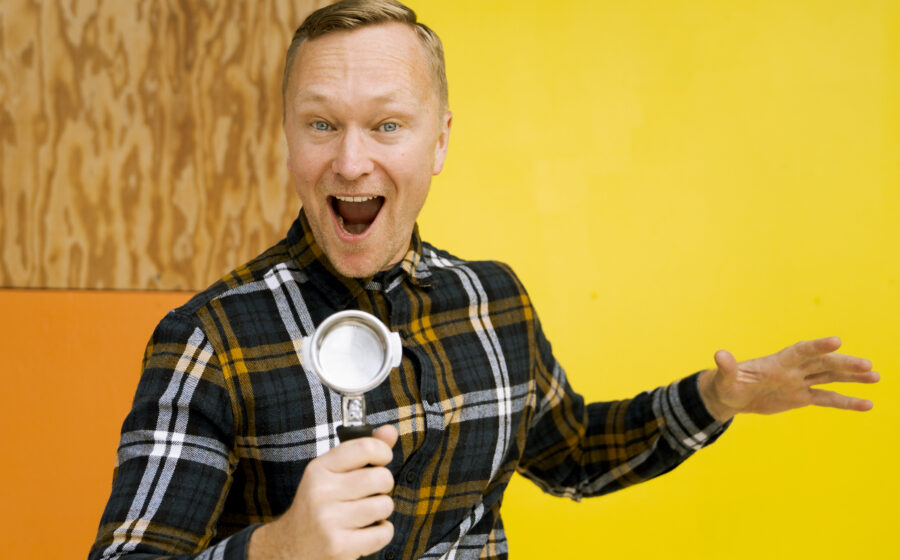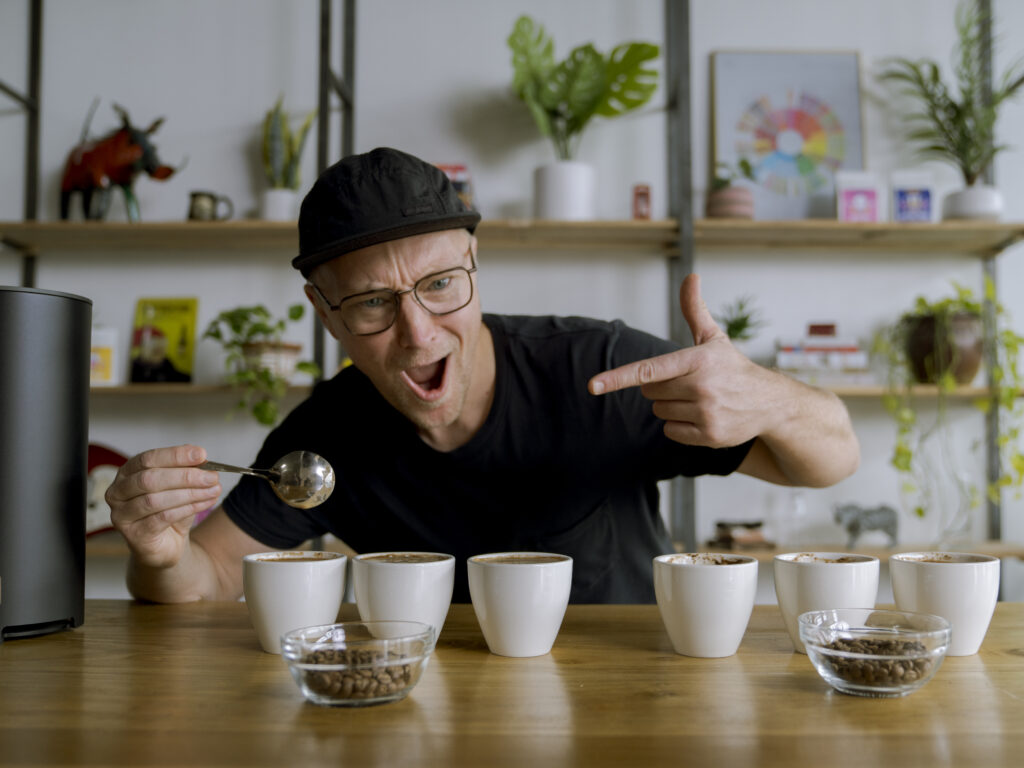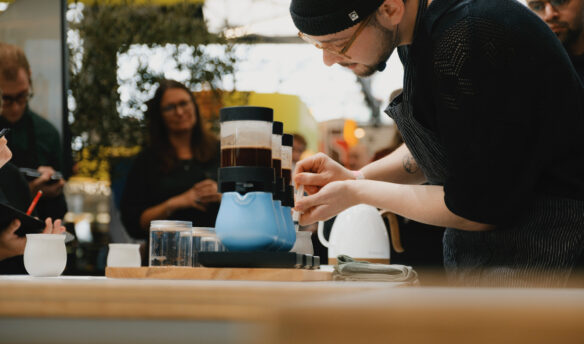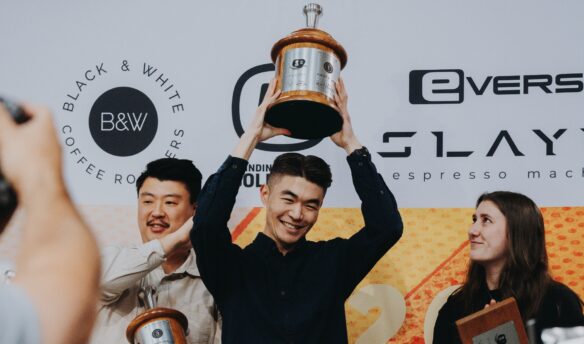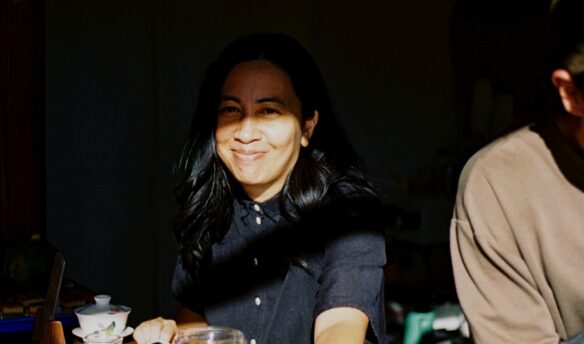Michael Craig admits he’s a lousy employee. Feeling like he was languishing behind the bar, Craig began brainstorming ways to pursue his passion for coffee despite his ambivalence about being a barista—but he kept coming up short. So when an opportunity to pick up a coffee catering gig came up, he jumped at the chance.
Craig had to borrow everything, from the espresso machine to the grinder, but the event was a success—and he realized he wanted to do more. Having toyed with business ideas like starting a coffee subscription or opening a cafe, this event helped Craig recognize that the true hole in the market was espresso catering.
Craig realized he wanted to bring the joy and quality of specialty coffee directly to people. Rather than opening a shop people who have to come to, he would go to them wherever they’re at—from office buildings to weddings. Thus, Creature Coffee was born, starting with just one mobile coffee cart in 2019 to now ten custom-built carts serving the Austin area. Not only is Creature Coffee available for hire to cater your next event, but they can be found selling and serving coffee at neighborhood events like the Sustainable Food Center’s weekly farmers’ market in downtown Austin.
Creature Coffee has grown quickly: along with expanding his fleet of mobile coffee carts, Craig began roasting in 2020, but he stands firm in his passion for coffee and believes a shared love for coffee unites his employees and drives the direction of Creature Coffee.
“I’m a coffee geek,” he says. “We employ a lot of coffee geeks, and we go out and be geeky with people who love coffee,”
Fresh Cup: What are some of the biggest differences between making coffee in a brick-and-mortar space versus a mobile cart?
Michael Craig: I think when you have a coffee shop, you set up your coffee shop, and it works until a machine breaks. And that’s not that’s not the case for espresso catering. You set up your cart every single day, and you tear it down [every single night]. So you have to think about waste, the water, power sources—everywhere you go has different sources of power, different sockets. Sometimes, you’re on the 36th floor of an Austin highrise; sometimes, you’re in a rickety old barn, and there’s dust getting inside your espresso machine.
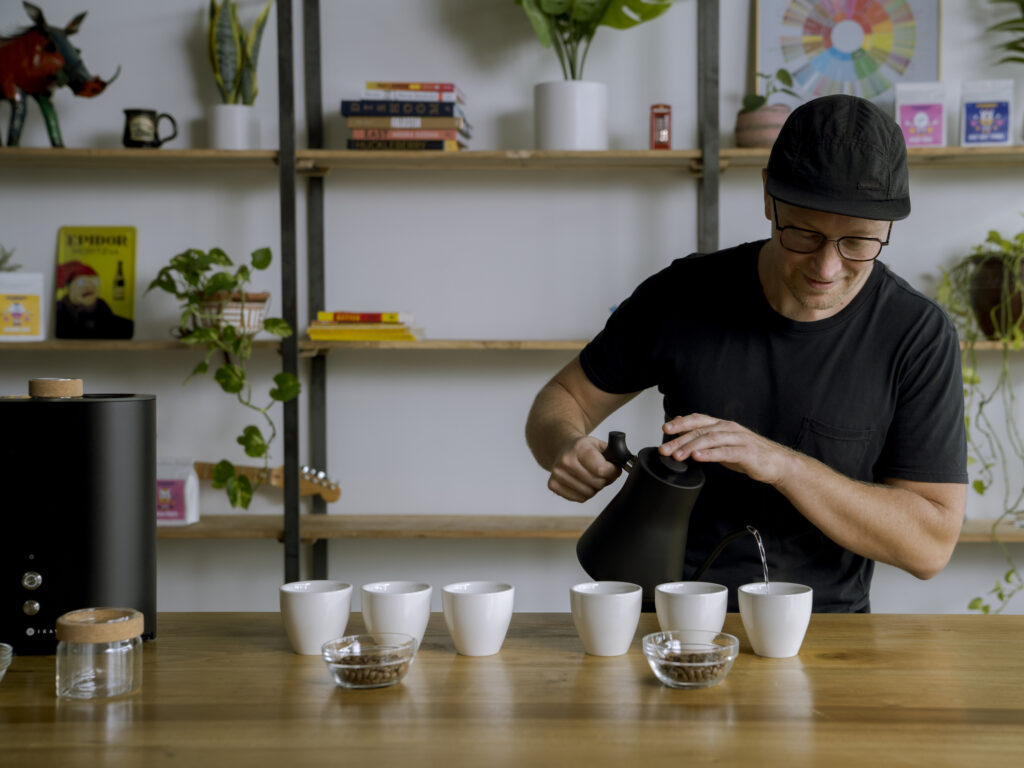
With event catering, you’re working against the elements, and nobody has a clue what they’re doing. Everybody just wants their coffee. I think this is why most people who start with coffee carts or catering businesses quit. They worked out how to plug everything in and get everything to work, but something breaks, the espresso machine goes down, or the water supply runs out—things you don’t think of as a barista. When you do event catering, these are all issues you need to sort out on the fly. There’s just so many lessons to be learned.
How do people find and hire you to cater their events?
I couldn’t possibly tell you! But, and I think this is the same for other businesses, your people are your best asset. In the early days, when it was just me, people found me and my British accent charming. I love talking to people, and I love being with people. And I love looking after people and making sure they feel welcome.
I think it’s attitudes like that that make people go, “Oh, you know what, I’m going to share this coffee cart on Instagram,” or “I’m going to talk to my friend Dave, who’s getting married and tell him that he needs to get an espresso bar.” Word-of-mouth referrals are now half of our business. Half of our business is people who have visited one of our carts, tried our coffee, and wanted someone else to share that experience.
You’ve alluded to the fact that coffee catering operates differently than a traditional retail space. Beyond figuring out what to do if a machine breaks or your water lines shut down, it’s also different from a service perspective—baristas aren’t ringing up customers, and it can be challenging to cultivate the right vibe for serving, let’s say wedding guests, then customers that choose to come to your cafe. Do you think differently about adapting to new customers from event to event? What are some of the perks of a catering service model?
I think most of our baristas enjoy not charging—it’s especially nice when people can order exactly what they want and not have to worry about that $1 upcharge for almond milk or sugar-free vanilla syrup. That’s especially true if we’re catering events in the city where people have their regular coffee spots, and they’re used to seeing menus with espresso-based drinks. But we also cater events outside of town, where people have never had a cup of coffee smaller than 16 ounces.
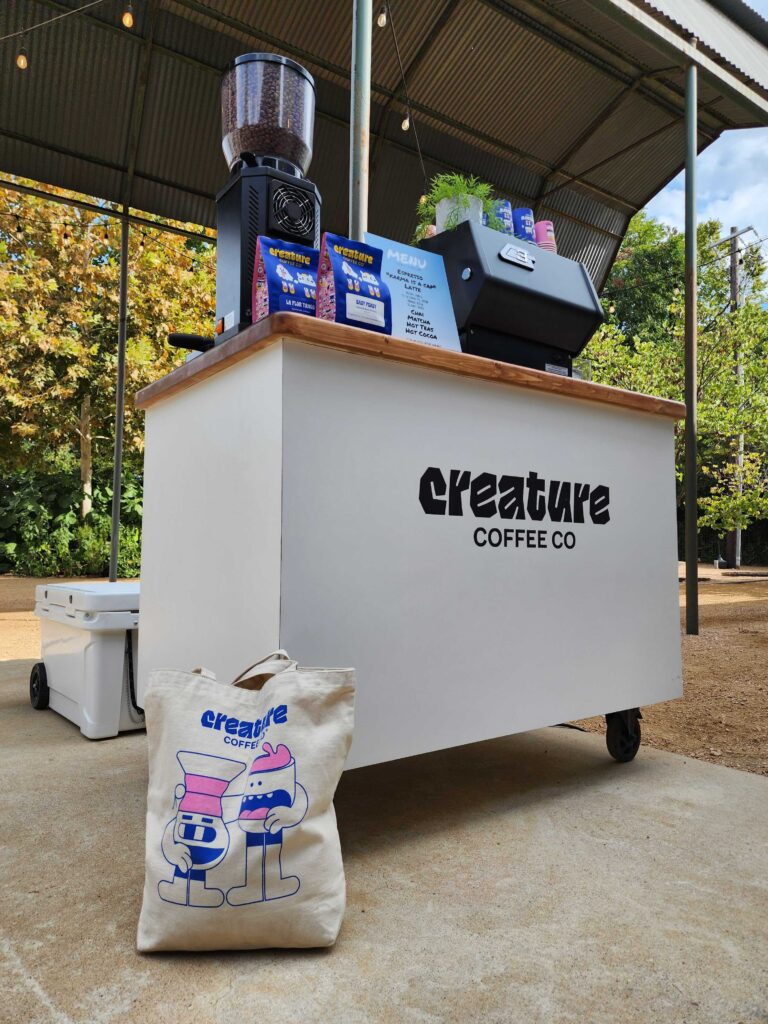
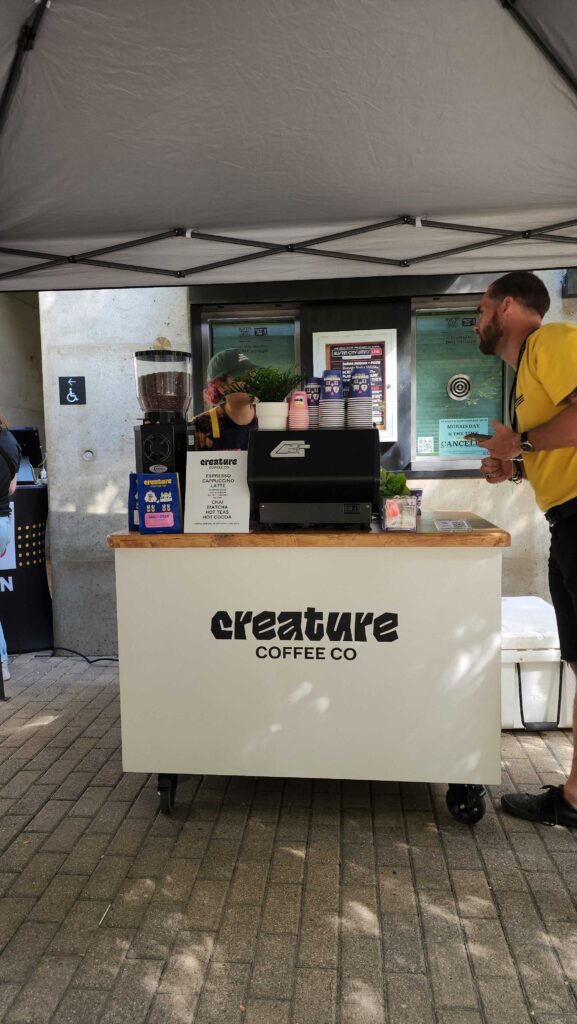
We try our best not to be pretentious because there are a lot of people who serve specialty coffee who can be standoffish. Like there’s a mystique around coffee and a “Oh, that barista is too cool to talk to” mentality. We don’t want that. We want to break down those barriers and let customers know that this is really good quality coffee and to give it a try. And we usually have a really, really good reaction. The way I like to put it is that we are warriors of the specialty coffee world. As you know, specialty coffee is four percent of the world’s coffee industry. We’re going to places, doing events, and introducing people to their first-ever cup of specialty coffee, and that’s pretty awesome.
You’ve had to make a lot of decisions about how you serve drinks. For example, you make all your own syrups. How did you think about making strategic menu decisions?
In terms of syrups, if you’re a business owner, you would say, “That’s a terrible idea, Michael. Why are you doing that?” And my response is, “Because it tastes good. If we used a vanilla syrup that everyone else uses, that’d be fine, but our version tastes better. That was pretty much the only driver behind that decision. Sometimes it gets hard when it’s really busy, and we have those extra things to do. But we wanted to focus on quality.
You have carts that offer full espresso service, but you also have carts with an iced latte bar setup—and the iced lattes are made with cold brew concentrate versus espresso. Why’d you make that decision?”
When it comes to iced lattes, that was purely a decision based on volume. In a sprint, a good barista on a single group espresso machine can make 50 drinks an hour—that’s a very general estimate. Steaming milk and pulling espresso shots takes time. But when we did the iced lattes, we realized we could still achieve the same quality using a cold brew concentrate. It also meant we could do 100 drinks in an hour.
Also, on the iced latte bars, we don’t need any power; we can just pour those drinks from a keg. If we’ve got 1000 people and we need to give them all a drink within a set amount of time, let’s say two hours, we can set up an iced latte bar and get those drinks out quickly and easily. Plus, we live in Austin; it’s hot, so people love having our iced latte bar as an option.
What’s the largest event you’ve ever catered?
The largest event we’ve ever done was three coffee bars at that one event. However, we did an event for the Moto GP Circuit of the Americas (an annual motor race held in Austin) and I think that was the craziest one we’ve ever done. The rain came pouring down and everyone in the VIP tent came to our cart all at the same time, ordering drinks—they didn’t want food or cocktails; they just wanted coffee. It was wild.
What is your favorite type of event to cater?
For me, it’s offices which is most of what we do. Setting up a coffee bar before anyone gets in and seeing people enter work is great. The office workers stare at you for a few seconds, but then their confusion turns into delight as they realize you are there to serve them coffee. “Yes, I don’t have to drink the K cup today!” And then we get to have this great interaction over coffee.
You started roasting in 2020—why?
It was a very deliberate decision. Before we had ironed out the details and settled on our current business model, we had a small coffee bar inside the Native Hostel. But then, in March, the world began collapsing around us [due to the COVID-19 pandemic]. We ended up closing the coffee bar and focusing on roasting because that’s what we could control—we could send coffee to people’s homes.
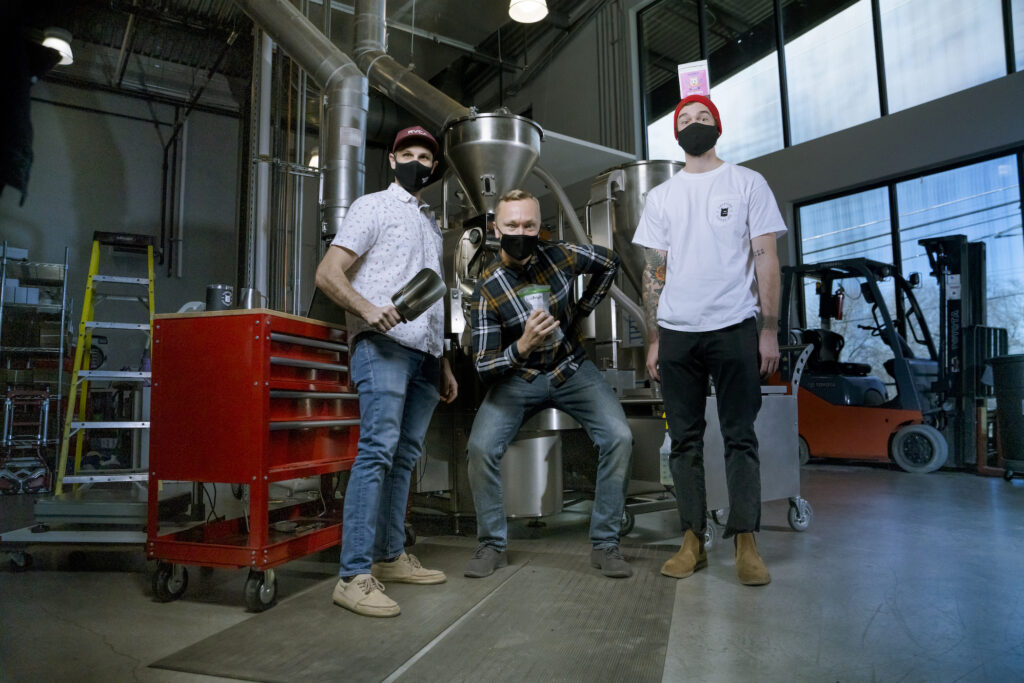
We also had a dip in events, so we focused solely on getting roasting up and running. Then, when the world kind of returned, the roasting seemed to, surprisingly, take off for us. So we asked, “Do we try to get another coffee shop?” But the espresso catering was taking off, too, and we decided to focus on what we do best. And that’s catering.
Currently, you roast at Rising Tide, a co-roasting space in Austin. How has that helped you grow your roasting operation?
The co-roasting has been extremely helpful because the upfront cost to start roasting is crazy. Nobody can afford to spend $250,000 for the roaster, the installation, the permits, and everything you need to open a roasting space. So, for us, working in a co-roasting space is perfect. We’re only at Rising Tide for about 10 hours a week, so until our volume is much higher and it makes financial sense, we are never going to roast on our own—and that’s okay.
Where do you see the future of Creature Coffee going?
In the past year, we’ve seen more espresso catering businesses popping up. But I also feel like we know where the market is, especially after the pandemic. We have a really solid team, so now the question is, “How can we replicate this in another city and grow even further? How can we help more people enjoy specialty coffee at events across the US?” I’m not going to say anything else until it happens, but we’ve got our eye on a couple of cities, and we’re making plans for the future.
And just for fun, what is your favorite coffee drink?
I enjoy getting an espresso and a pour over of the same coffee so I can try one coffee two different ways. That’s my favorite.
This interview has been lightly edited for clarity.



